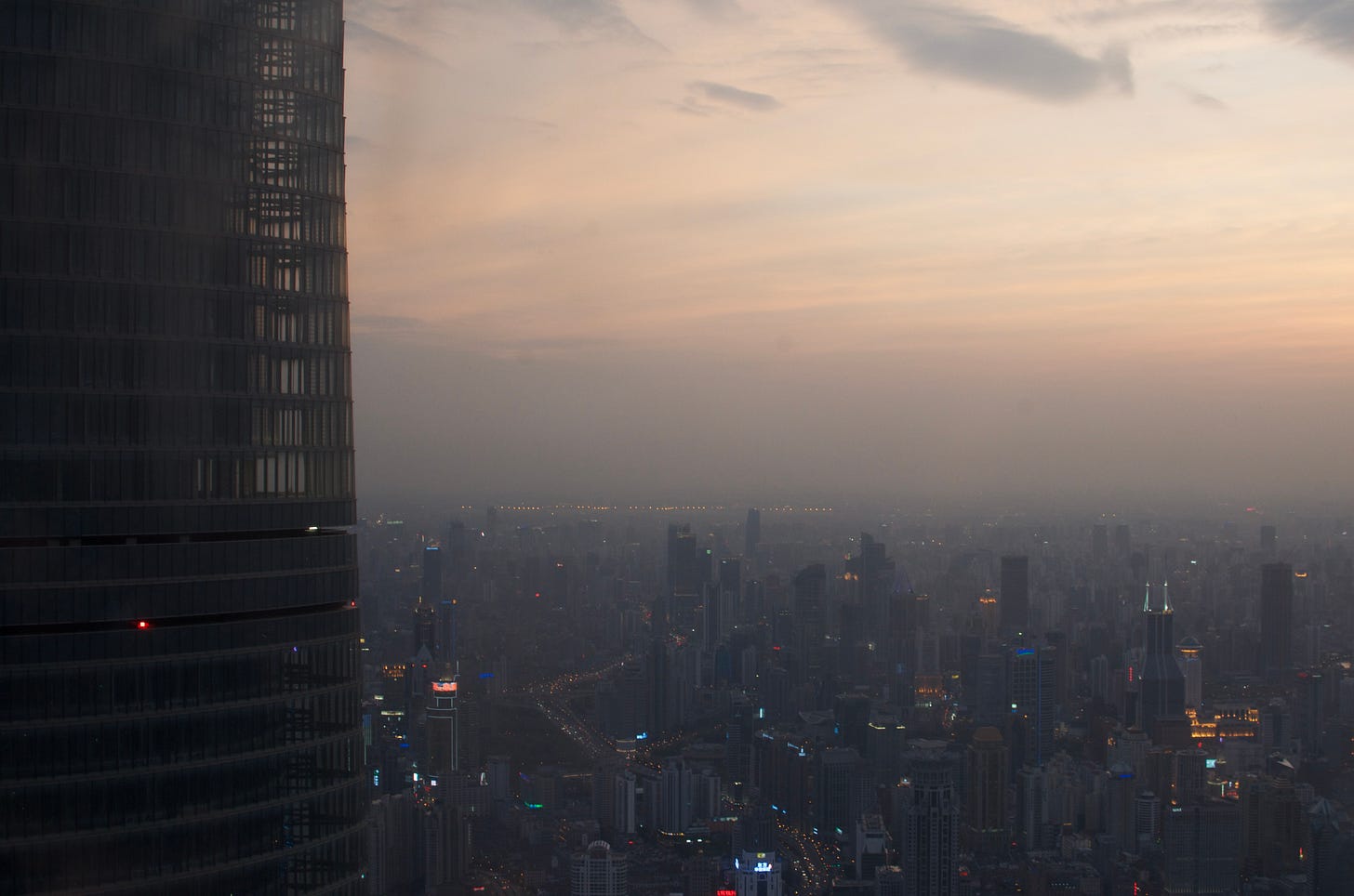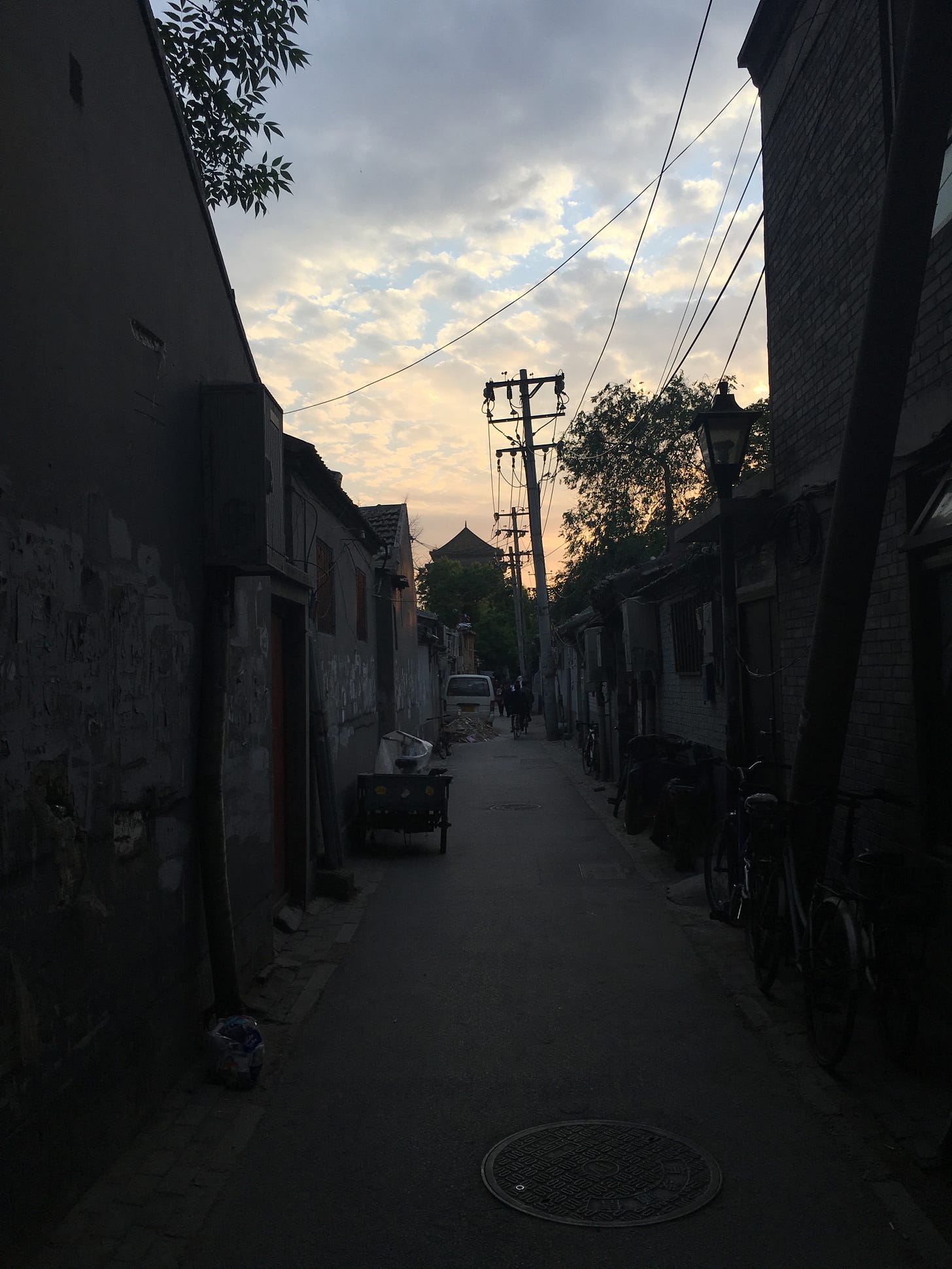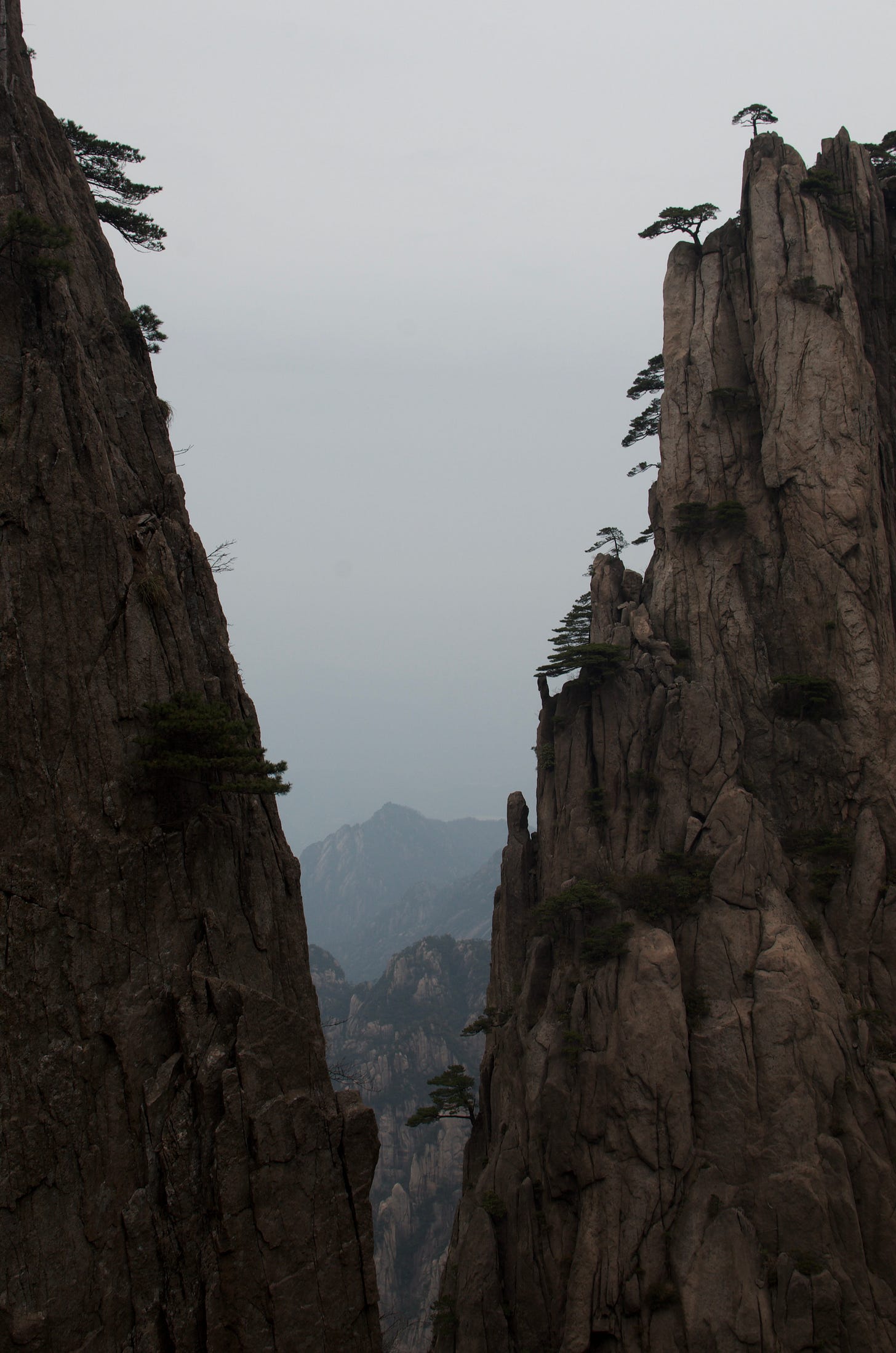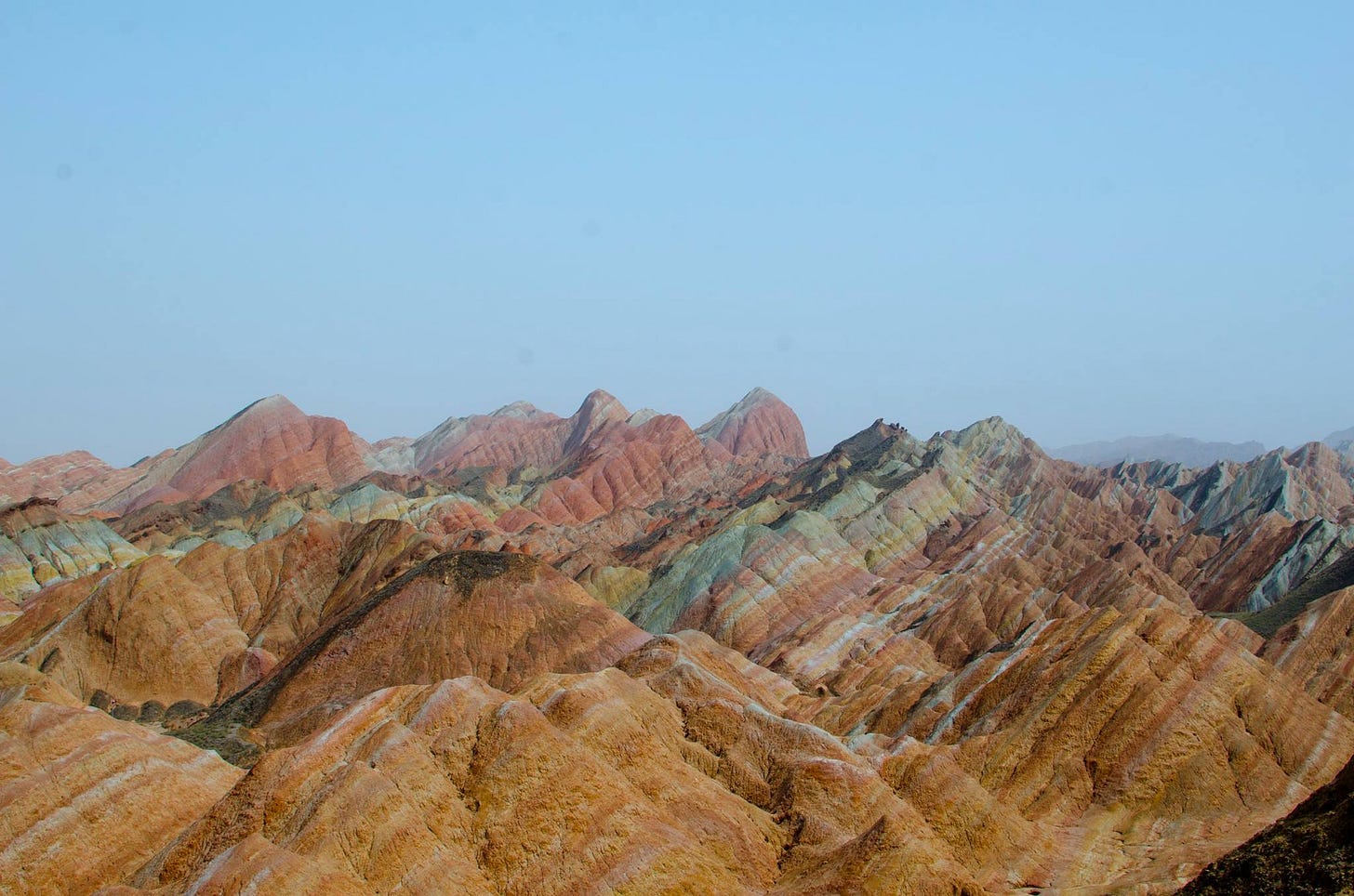My time in China
How my small visits to China shape my thinking on the main geopolitical plotline of this century.

I’ve been thinking a lot about China lately. It’s hard not to.
China is once again living rent free in the heads of the western foreign policy establishment, a full lifetime after the debate over ‘who lost China’ in the late 1940s breathed life into the American right. But this time China is not a war-torn land of peasants - it’s the predominant industrial power in the world.
This puts it at the heart of not just debates about security and the economy but about climate change. For while it remains the world’s largest emitter, it is also the world leader in green technology, and accounts for about 40% of installed renewable capacity in the last five years. No one else seems to have worked how to make solar panels and EVs anywhere near as cheaply as China can, and it seems unlikely they will soon.
I wrote my North + South column about China this month (pick it up in stores or on Libby with your library card!), attempting to wrestle with the moral complexity of all this. How do we deal with the fact that our largest trade partner is run by nasty autocrats who seem quite keen on interfering with our politics? Do we really want to pal up with the more militarily aggressive US on this?
But I also wanted to write a bit here about my personal experiences in China - partly because I’m trying to get better at doing this newsletter more, and partly because this isn’t the kind of piece I’d try to place anywhere. I don’t make any big claim about these experiences revealing anything incredibly new or trenchant about this continent-sized country. My China was inescapably the one a Western visitor gets to see, especially as I don’t know the languages and literally look like the cartoon spy they warn their citizens about. But it was still the most interesting place in the world.
I first visited China as a pre-verbal infant in the early 1990s. I don’t remember it at all but there are photos of me with a huge mess of red hair being gawked at by various older men. This was right in the middle of the Jiang Zemin era, when China was starting to really see the fruits of the Dengist reforms that opened up its economy. My parents tell me it was a very difficult but very rewarding trip.
I next visited in 2009 as a 16-year-old, visiting some family who were posted to Guangzhou and going through Hong Kong and Yunan in the far west. This trip got me somewhat hooked on the country. There was so much here - from the incredible jagged peaks of the mountains to the water wheels in Lijiang to the endless alleys of Guangzhou’s markets, where I could buy snakes or scorpions or pirated DVDs if I had the money. I also remember, very clearly, a young homeless boy with a no legs desperately trying to get the millions of strangers who were walking by to help him. I had seen homeless people in New Zealand before - of course I had! - but these were usually adults. I also remember trying to take a photo of the CCP office and being stopped.
But I learnt the most about China when I was last there in 2016, on an Asia NZ scholarship. Asia NZ is a think tank largely funded by the New Zealand Ministry of Foreign Affairs and Trade (MFAT) which at the time seemed to operate with a bit of revolving door between the Ministry and the organisation. Asia NZ had an official mission of encouraging Kiwis to thrive in Asia and build connections, and this seemed to meld exceptionally well with the thinking of MFAT at the time, in particular with regards to China. (I should be clear here and say that everyone I worked with at the Foundation was wonderful, and increasing understanding with Asian countries is a worthy cause!)
The NZ-China relationship was at a very different point in 2016, both in Cabinet and in officialdom. John Key was Prime Minister and was a relentless promoter of two-way trade, visiting while I was there to sign various cooperation agreements, welcome Chinese investment into NZ, and meet President Xi. This was some years into the Xi reign, and it wasn’t all warmth and kisses - there was a seemingly perfunctory warning to Key not to mention the South China Sea, and a similarly-perfunctory promise from Key to restate NZ’s position on the matter if it came up. But it was a long way from where we are now, with Key’s chosen successor promising to name and shame cases of Chinese espionage, and many repeated statements about China’s appalling record in Xinjiang.
To be clear, I don’t think relationship solely changed because New Zealand got spikier. China has definitely changed in the last decade. Xi has massively consolidated power. He has purged untold numbers of officials for alleged corruption, including many rivals. The country as a whole has become more self-confident and willing to sabre rattle on the world stage.
All of this to say, I can see why the Asia NZ Foundation don’t seem to offer the specific internship I took up in 2016 any more - a job at the state-run Shanghai Daily.
My internship not doing much
The Shanghai Daily is an English-language paper owned and controlled by the local communist party. I knew going in that it would be a quite strange experience, and I was not likely to emerge with many incredible clippings.
Reader, I did not do much. I came in with some story ideas that wouldn’t require much in the way of language skills - these were shot down quickly. That I was used to (I was a very junior reporter!) but I was not ready to not really be given anything else to do afterwards. I tried in vein to find work to do and eventually got given some English-language videos to subtitle (ah those halcyon pre-AI days) and to go to a few openings for business/product launches and the like. They got me to write some stories about the flag referendum, which they were very interested in as a symbol of NZ throwing off the yoke of the UK. But this was nowhere near enough work to fill a day1.

The other staff on my day shift were incredibly pleasant. They took me out for lunch and attempted to teach me rudimentary Mandarin (I could never quite get the tones). They asked me untold questions about New Zealand and why on earth I was doing this internship. One spoke with the confident kind of British accent one usually only finds in about two London boroughs - when I asked him if he had gone to school in the UK he replied simply “David Attenborough, darling”. From my circumspect questioning, I was able to ascertain that everyone else working there were members of the party, which is utterly unsurprising - you have to be to really get anywhere in China. They treated this membership with a kind of cool but weak irony, like a trust fund kid explaining gingerly why he doesn’t have a summer job.
At night, a group of old English hacks would troop in to sub-edit the copy the day-shift writers had turned in, turning it from the strange but largely correct English of the middle-class Chinese reporters into more fluent English. But in truth much of every day’s edition was just copy from Xinhua, China’s news wire, sometimes ‘retopped’ with a local angle.
The main thing I came out of the work experience with was an appreciation for competitive discipline in NZ media. Sure, it’s always nice to have time to write long and important pieces and not ‘feed the beast’ of daily coverage. But without the rigour of always trying to tell my audience new things first and keep my job I fell into the worst kind of lethargy. Signals from your audience about whether they are fundamentally interested in your work are very important.
Seeing the Middle Kingdom
Luckily I had time to do more than twiddle my thumbs in a media office.
Shanghai had a burgeoning and very fun art scene, as well a big expat community to drink overpriced beer with.
China had an incredible system of cheap and fast trains that really unlocked the vast nation. (The high speed rail network has since more than doubled in length.) On these trains eager young people would introduce themselves to me via the translation function on WeChat, then explain their lives to me. The train was also good as a reminder that urban China is still not the whole story - that there are countless little villages on riversides with no tall buildings or rich people.
I never felt in any way unsafe - even when I accidentally got a bus to a town that had an identical name to the town I was staying in, but was 60km down the road. You might get scammed as tourist in China, or even picked up by the police for questioning if you don’t register where you are staying with them - but you probably won’t be physically harmed.
I went to Beijing to see the hutongs - traditional high-density low rise neighbourhoods of narrow alleys that are being slowly erased from the city, but still give you a taste of Chinese neighbourhood living as it has been for centuries - communal and quiet. Across these neighbourhoods sat little jian bing stands - a kind of savoury pancake usually filled with egg and meat, made fresh after you order for the equivalent of less than $1NZD. This food was cheap, even for China, but I saw several older ladies bringing their own eggs to be cooked inside the crepes - making them even more affordable. There is some canniness one never grows out of.
I went hiking in Huangshan, made famous as (one of) the inspirations for Pandora in Avatar. It was beautiful, but as with hiking in much of Europe it made me really appreciate the benefits of our small population - they had rubbish bins every 20 metres, and they were almost all full.
But where some places had too many people, others had nowhere near enough.
I travelled through Inner Mongolia to the famous ‘Ghost City’ of Ordos, specifically the brand new Kangabashi District - supposedly built for amount a million people but featuring a population in the tens of thousands. It certainly lived up to the hype. Think an urban area as built up as central Auckland but where the only other people you see are tending to the gardens on the huge public parks, or are clustered around a single mall where there is some real economic activity. I just strolled into a few apartment blocks that had been left half-built or empty, much as I would in a post-apocalyptic video game. Indeed, I have never had a day that felt more like a video game in my life - there was a creepy abandoned fun park and everything.
This kind of overbuilding was due in part to local officials trying to one up each other, but also to the massive Chinese real estate bubble - which led to about a third of the country’s economy being based in housing at one point. The country is in the process of deliberately but slowly popping that bubble. This is a high wire strategy where many people and companies are losing massive amounts of value, but the economy is not quite falling over. If they can pull this off it will be very impressive.
I also went right up to the north west and Dunhuang, on the edge of the Gobi Desert, and down through Gansu to the “Rainbow Mountains”. Here there was more of a backpacking culture than elsewhere, and I met plenty of young Americans and Brits halfway through degrees in Chinese universities. This group was obviously self-selecting, but I’m struck now looking back how warm all the Americans were to China - how much they respected the language they were learning and the complex culture they were visiting. You could barely move for the cliches about the ‘oldest continuous civilisation in the world,’ about how their connection to the past was so much stronger than ours because they could still quite easily read the script from thousands of years ago. I trotted out a lot of these myself.
There’s been a big strand of semi-revisionist history in the last few decades that puts China back in the centre of world history - arguing that for most of recorded history it has been the richest and most advanced nation in the world, with the West a poor cousin that is having a (perhaps temporary) upswing. The historian William Dalrymple has just published a book that moves this focus southwards - from China to India, which he argues was the real centre of the world. I don’t have anywhere near the scholarly competency to really weigh in on this one, but I will say that the myth remains incredibly powerful in China - that they are on their way back to their rightful place at the top of the world.
My time in China made me think this was possible, but not inevitable. You didn’t see any young Chinese people bringing their own eggs to make into Jiang Bing. Becoming middle class is a wonderful thing for an individual, but it can be troublesome in the long term for a country that wants to dominate, as it reduces birth rates and makes people expect more comforts. Perhaps the window for hypergrowth has closed for good and China will become ‘Big Japan’ - rich but not getting much richer, with few ambitions to become a global hegemon. Perhaps we are seeing the kind of growth that turned the US from a clutch of protestant Brits into the most powerful nation the world has ever known.
The Chinese people I met did seem to buy into this myth of national regeneration - even if some did it a bit ironically. But how could they not? The state might not let them use Facebook without a VPN, or form an independent labour union, but over a single lifetime it had given them a quality of life unknowable to their parents, had taken the country from being 80% illiterate in 1949 to 3.6% illiterate in 2015. No one I met approached the kind of rabid nationalism seen in the Global Times or seemed to care about something like the South China Sea, but they were proud of their country. Of course, I mostly met people from the successful middle class who could speak English, and talking China down to a foreigner is not exactly smiled upon by the state. I didn’t go to Xinjiang to see that state at its worst. Yet this attitude of positivity did not feel put on.
China isn’t a democracy. But that doesn’t mean the opinion of these people - especially the middle class ones - aren’t extremely important to the way the country is governed. Indeed non-democracies are generally the systems most interested in public opinion, as they need barometers outside of elections to ascertain how well people think the country is going. It is not a monolith of a country, where everyone thinks the same things or is moving down the exact same path. If we are in New Zealand to keep plotting an in-between course, one where we rely on China economically but the US militarily, we we will need to understand not just what is going on in Xi Jinping’s mind - but also what those real people think.
Recommended reading
If you want to read more about China, I really love the books China in Ten Words and Oracle Bones. The Three Body Problem is great too.
Thomas Coughlan on why Wellington isn’t dying.
Eloise Gibson on tailpipe emissions.
Duncan Greive on ten years of The Spinoff.
John Lanchester on what finance is for - featuring an incredible study that found the odds of flipping a coin are not actually always 50/50.
Matthew Maltman on how zoning reform increased NZ’s construction productivity.
Alice Neville on the Govt’s mission to reduce crime.
To be fair to the paper, having now been on the other side of the intern relationship, it can be pretty hard to find proper work for them to do.








Ngà mihi, enjoyed reading this!
Enjoyed reading thanks! Appreciated the balanced analysis 👏